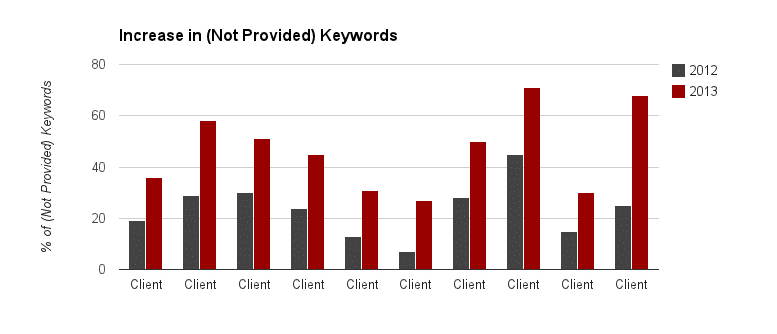(Not Provided) Increases to 51% of Referring Keywords
In October of 2011, Google began encrypting search data in an effort to offer greater security to the personalized data of its users. As a result, the referring keywords used by people to find your content online were hidden in Google Analytics and replaced with (Not Provided). This was not a penalty or algorithm change, rather an attempt by Google to provide greater security to its users. Note that (Not Provided) does not impact paid search data.
The Impact of (Not Provided)
According to Matt Cutts of Google, (Not Provided) was originally estimated to have an impact in the “single digit percentages” upon full roll-out. That was in 2011. Since the initial rollout, the number of organic visits attributed to (Not Provided) has steadily increased. During a recent review of our own client data, we made a shocking discovery: more than 50% of our client organic search volume is consumed by (Not Provided).
In the first half of 2012, (Not Provided) had already consumed more than twice the initial volume of search queries estimated by Google for our clients. Below you can see the range of impact from (Not Provided) for our clients in the first half (January to June) of 2012.
Client (Not Provided) Summary – 2012
- Average: 25%
- Highest: 45%
- Lowest: 13%
At the conclusion of the first half of 2013, we compared the (Not Provided) data for the same clients and discovered that (Not Provided) had doubled and even tripled for some of our clients. One organization in particular had 71% of their search queries hidden by (Not Provided)!
Client Not Provided Summary – 2013
- Average: 51%
- Highest: 71%
- Lowest: 31%
In the graph below, we can see that on average, the percent of organic traffic consumed by (Not Provided) has doubled, which is obviously well beyond the initial estimates by Google.
Does this mean that SEO is dead?
No. As long as people will search for information, then search marketing (paid and organic) will continue to exist.
What do we do without keyword visibility?
Google is telling us to be better marketers and not gamers of the system. We need to focus on writing to our audience and not the search engines. More specifically, this means creating content that connects with your target audience in each stage of the buying cycle (Awareness, Research, and Purchase). Within each stage we need to address their needs, concerns, and pain points. Then we will align keywords with content to ensure adequate search volume and proper language use. There are still loads of tools out there to find keyword data. In doing so, we will create content that they will engage with, share, and link to. That’s how we extend the reach of your content and connect with people.
What we DON’T want to do is write twenty pieces of content using different variations of the same keyword. Google has evolved to the point where they know that “fantasy book” and “books about fantasy” carry the same intent, so you don’t need one page for each term.
Closing Thoughts
The higher level take away here is that SEO is evolving beyond optimizing keywords. It’s becoming a true marketing channel. Yes keywords are still part of the equation, but only a small part. The days of relying upon keyword rankings to define our success are becoming less and less important, as those rankings no longer tell the whole or most accurate story. At the most basic level, we need to shift our focus from keywords to using content to connect with our target audience at the right place and right time. You know – actual marketing.
If you would like to move beyond optimizing for keywords, our SEO team would love to hear from you!


